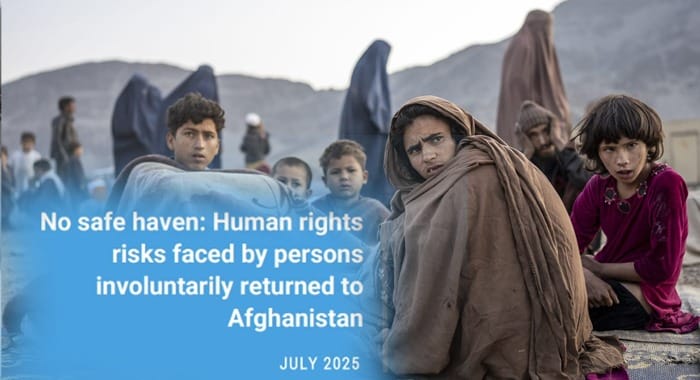The human rights situation in Afghanistan remains deeply alarming, with the Taliban’s policies continuing to systematically dismantle the rights of women, civil society, and former government personnel, according to a new United Nations report released this week. The report, issued by the United Nations Assistance Mission in Afghanistan (UNAMA), outlines widespread and institutionalised restrictions imposed by the de facto authorities since their return to power on August 15, 2021. It focuses on the situation of individuals at heightened risk of persecution, torture, and other forms of irreparable harm, and raises urgent concerns about the shrinking space for rights and freedoms within the country.
Among the most severely affected are women and girls, who have been almost entirely excluded from public life. The report catalogues an escalating pattern of state-imposed discrimination, including the denial of girls’ education beyond grade six, bans on tertiary education, forced observance of Taliban-defined hijab rules, and restrictions on freedom of movement that require women to travel only with a male guardian (mahram).
In May 2024, the Taliban formalised these restrictions by enacting the Law on the Promotion of Virtue and Prevention of Vice, which mandates that women conceal their voices, faces, and bodies in public. The law also obliges transport operators to refuse service to unaccompanied women, institutionalising gender-based exclusion in daily life.
“Implementation of these policies has resulted not only in the suppression of women’s rights but in acts of intimidation and violence,” the report states, citing documented cases where women were beaten at checkpoints for not complying with dress codes or sent home from markets for being unaccompanied.
The report also raises alarm about the lack of any credible legal recourse for survivors of gender-based violence. Complaints are typically handled by male officials, deterring women from seeking justice, while fear of reprisals from Taliban authorities has pushed many victims to rely on informal, traditional dispute mechanisms that offer little or no protection.
In parallel, the report details the Taliban’s failure to uphold its declared “general amnesty” for former officials of the Afghan government and the Afghan National Defence and Security Forces (ANDSF). Despite public assurances by senior Taliban leaders that no reprisals have taken place, UNAMA has documented credible reports of extrajudicial killings, arbitrary arrests, torture, and enforced disappearances of former officials.
“The Taliban have publicly committed to tolerance, but these statements are contradicted by continuing violations carried out with impunity,” the report notes, highlighting the absence of genuine investigations or accountability mechanisms for abuses.
The report also describes an increasingly repressive climate for journalists and civil society. Since August 2021, many media outlets have closed due to economic collapse, censorship, and the flight of journalists. Those who remain operate in a climate of fear, facing arbitrary arrest, detention, and threats of violence.
Meanwhile, civic space has all but vanished, with civil society activists—particularly women who have protested discriminatory policies—subjected to arbitrary detention and harassment. The targeting of female protestors has led to a significant decline in public demonstrations and further silencing of dissent.
The United Nations has reiterated that the de facto authorities’ policies violate Afghanistan’s obligations under international human rights law and warned that the institutionalisation of gender apartheid, suppression of political freedoms, and persecution of former officials are creating long-term conditions of fear and repression.
“This report is a clear call to the international community not to turn away from Afghanistan. The crisis is not over it has simply changed form,” a UN spokesperson stated.





